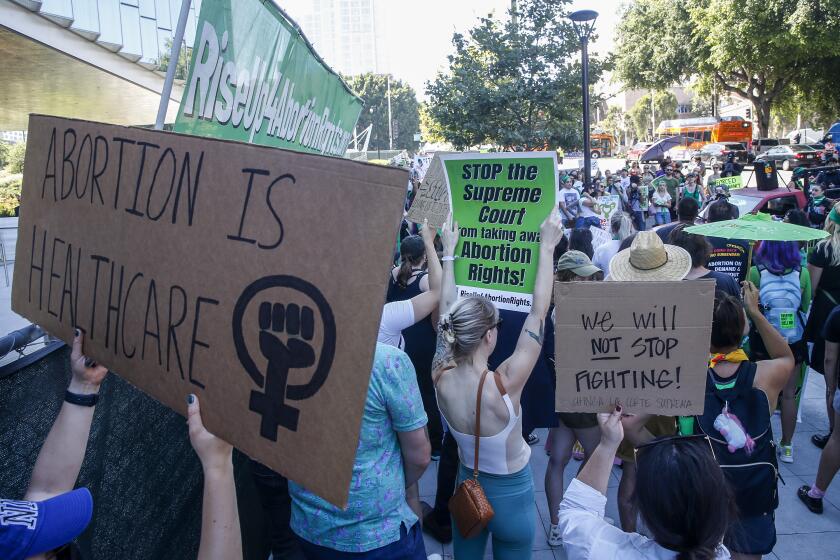On abortion access, employers have promises. They need plans.

- Share via
After the Supreme Court overturned Roe vs. Wade, a wide swath of corporate America came out with a message for its workforce: We will pay to help you get an abortion in a place where it’s still available.
From banking to technology to entertainment, executives vowed to support access to the procedure, some pledging as much as $10,000 to cover employees’ travel for abortion care. But it wasn’t immediately clear how any of this would work in practice.
Would a worker have to tell their employer that they needed an abortion to secure travel reimbursement funds? How would companies ensure workers’ privacy? What would they do to protect employees — and themselves — from potential legal attacks, such as those made possible by a Texas law that allows private citizens to sue anyone who “aids and abets” abortion? Would part-time workers and contract workers be covered? And would companies fight to restore the legal status of abortion in the places where it has been lost?
So far, the companies making the promises don’t seem to have a lot of answers.
“The worst thing you can do is promise your employees a benefit and then have no plan to make sure you can actually provide it,” said Sonja Spoo, director of reproductive rights campaigns at Ultraviolet, a national gender justice advocacy organization. “Don’t wait until a law passes to figure out what you’re going to do. Start figuring it out now.”
Experts and reproductive health advocates said that the new in-house travel reimbursement programs announced by many companies will require erecting safeguards around employee privacy. Without the right ones in place, some doubted that the benefit would be widely used — if at all.
“I don’t know that people would feel comfortable calling someone up and saying, ‘Hey, I would like to make use of this new abortion leave,’” said Jen L’Estrange, founder of Red Clover, a human resources firm.
Airbnb, Reddit, Snap, Netflix, Yelp, Wells Fargo, Microsoft, Rakuten, Starbucks and EBay are among major companies that said they would offer a travel benefit through their healthcare plans.
L’Estrange said there were several things companies could do to ensure workers feel comfortable accessing reproductive care. One way would be the creation of what she termed a “wellness policy” that would help workers access out-of-state healthcare of all forms, including but not limited to abortion, and would include generous paid time off, including unplanned sick leave to give workers time to travel and recover. As part of that policy, L’Estrange said, companies could provide a stipend paid to workers at the beginning of the year, “regardless of whether or not they use it.”
In the wake of the U.S. Supreme Court decision overturning Roe vs. Wade, many companies have vowed to help their employees seek abortions. Will it work to make access easier for Americans?
“I’d say take it away from the abortion question,” L’Estrange said. “You want knee surgery and you want to do it out of state? Great, we will support you in that.”
If companies are really serious about providing out-of-state care to workers, several reproductive rights advocates said, they will need to take action both inside and outside the office.
The Times asked more than a dozen companies that said they would cover out-of-state abortion care if they had a plan in place for defending against legal challenges, particularly in Texas. Airbnb, Reddit, Snap, Netflix, Microsoft, EBay, Wells Fargo, Dick’s Sporting Goods, Starbucks, Amazon, Discord and Boeing didn’t answer the question. Only Yelp and Rakuten responded directly.
“This is the right thing to do for our employees and we are not concerned about legal risk,” a Yelp spokesperson said in a statement. “With more than 200 employees in Texas, we felt it was important that they had consistent access to the health services they needed, no matter where they live.”
“I am unable to speculate on theoretical legal questions,” a spokesperson for Rakuten said in a statement. “While we do not have an office in Texas, we have about 70 remote employees in the state. We are committed to a unified employee experience where all of our team members can access and enjoy the same benefits, corporate culture, and career opportunities, regardless of where they live or any other identifying factor.”
Then there’s the bigger question of whether the companies asserting their employees’ right to reproductive healthcare are prepared to treat politics as a remedy, putting real money and force behind their promises.
Many supporters of reproductive healthcare called for corporations to use their powerful lobbying teams to fight to defeat anti-abortion bills in state legislatures and engage in other political pressure tactics.
Starbucks will pay travel expenses for workers accessing abortion or gender-affirming procedures when those services are not available closer to home.
“One thing corporations can and should do is try to fight back on this by saying we are not going to have jobs in your state, we will not have our conferences in your state,” said Cary Franklin, law professor at UCLA and faculty director of the Center on Reproductive Health, Law and Policy. “It’s not just states that have power over corporations. Corporations have leverage too.”
Advocates also said corporate political giving should be brought in line with public declarations of supporting employees’ access to reproductive care.
Since 2020, American corporations have donated $195.4 million to anti-abortion lawmakers, according to Ultraviolet. In the South, where all three of the major Supreme Court abortion cases of the last decade originated, 79% of corporate political giving goes to anti-abortion lawmakers, the group found.
“You can’t on one hand fund these extremists and then beg forgiveness for your sins by paying for your folks to go out of state for care,” said Spoo, of Ultraviolet. “Corporate America’s contributions to anti-abortion politics have led us to this moment. They are absolutely on the hook for getting us out of it by pulling their funding from the politicians who are actively working to roll back our rights.”
Political action such as supporting candidates who favor Medicaid expansion would have the potential benefit of improving healthcare access for those who aren’t covered through their jobs — a group that includes many part-time and contract workers at the companies that have announced new benefits.
Providing reproductive care that includes abortion supports workers’ health and their careers, said Franklin, the UCLA law professor. “But 75% of people in this country who get abortions are poor and low-income and they don’t work for major corporations. They don’t have jobs with Microsoft.”
Corporations paying for out-of-state reproductive care was “fine” but “not the solution,” said Eileen Appelbaum, co-director of the Center for Economic and Policy Research. Because so many women are left out of the equation, Appelbaum said, “the best solution [for corporations] is to contribute to a reproductive healthcare fund.”
The Times asked companies if they had donated to such funds, but most didn’t answer. A Yelp spokesperson said in a statement that the Yelp Foundation double-matched employee donations to organizations fighting anti-abortion legislation in Texas and elsewhere, as well as organizations such as the Center for Reproductive Rights, NARAL Pro Choice America, Lilith Fund, Planned Parenthood and Planned Parenthood of Greater Texas.
At the same time, Yelp Inc PAC has made political donations to anti-abortion Republicans, including U.S. Sens. Ben Sasse of Nebraska and John Boozman of Arkansas, Reps. Ken Buck of Colorado and Jerry Moran of Kansas and others, according to Open Secrets.
Appelbaum believes corporations will have a harder time hiring women in states where abortion is illegal. Workers want to know that they will have the healthcare they need in all kinds of scenarios — a life-threatening ectopic pregnancy, for example, or an incomplete miscarriage that could lead to sepsis. It may not be clear until it’s too late when “life of the mother” exceptions to abortion bans apply. “Women will seek out companies in states where they don’t have to worry about this,” Appelbaum said.
Ultimately, laws banning basic reproductive healthcare will lead to a situation in which “the economies of those states will really suffer,” Appelbaum said. “Educated women who have options will not stay in those states. There will be a lot of people voting with their feet.”
More to Read
Inside the business of entertainment
The Wide Shot brings you news, analysis and insights on everything from streaming wars to production — and what it all means for the future.
You may occasionally receive promotional content from the Los Angeles Times.













